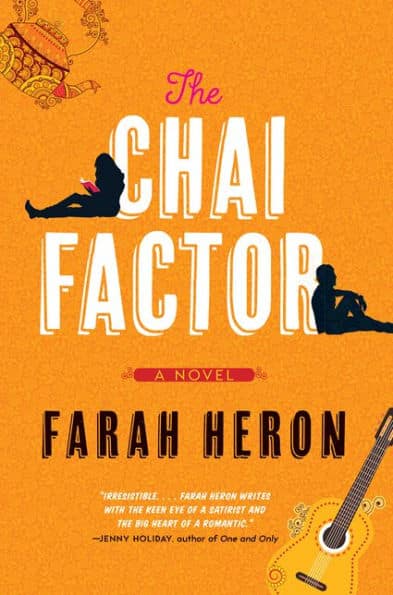How Rachel Brooks Pitched Farah Heron’s THE CHAI FACTOR
- By: admin | Date: Jun 11 2019

Happy pub day to debut rom-com THE CHAI FACTOR!
Sometimes a book’s back cover copy looks drastically different than the agent’s pitch or the author’s original query letter. In Farah’s case, much of her book’s pitch stayed the same through all phases. I thought it would be interesting to show how sometimes an author’s words keep living on and on (and all the more reason to write a strong query letter).
First, the meat of my pitch (using quite a bit from the original query):
As a thirty-year-old engineer, Amira Khan has one goal: submit a kick-ass thesis so her sexist boss will give her the promotion she deserves. She leaves grad school two weeks early to finish her paper at her family’s quiet house. But her grandmother has rented the basement to… a barbershop quartet. Seriously? Amira needs silence, they need to rehearse for their competition, and baritone Duncan is driving her up the wall.
Yet there is more to Duncan than his impressive beard and flannel. When the small-town singer confesses a weakness for women who fight for themselves, their verbal battles end in the bedroom. But can she have a future with someone so ignorant of her culture, and worse, his own family’s bigotry?
When intolerance rears its ugly head and people close to Amira get hurt, she realizes any future with Duncan means fighting more hate— and she’s not sure she has any fight left. But maybe it’s time to use the only weapon she hasn’t yet: love.
Second, the final back cover copy:
Amira Khan has no plans to break her no-dating rule.
Thirty-year-old engineer Amira Khan has set one rule for herself: no dating until her grad-school thesis is done. Nothing can distract her from completing a paper that is so good her boss will give her the promotion she deserves when she returns to work in the city. Amira leaves campus early, planning to work in the quiet basement apartment of her family’s house. But she arrives home to find that her grandmother has rented the basement to . . . a barbershop quartet. Seriously? The living situation is awkward: Amira needs silence; the quartet needs to rehearse for a competition; and Duncan, the small-town baritone with the flannel shirts, is driving her up the wall.
As Amira and Duncan clash, she is surprised to feel a simmering attraction for him. How can she be interested in someone who doesn’t get her, or her family’s culture? This is not a complication she needs when her future is at stake. But when intolerance rears its ugly head and people who are close to Amira get hurt, she learns that there is more to Duncan than meets the eye. Now she must decide what she is willing to fight for. In the end, it may be that this small-town singer is the only person who sees her at all.
Conclusion: Thanks to Farah’s great query, both her editor and I had a lot of strong sentences to work with and didn’t have to tweak too much along the way! This isn’t always the case (and not necessarily because the query was poorly written). Sometimes an agent or publisher want to position the book in a different way, make something more concise, focus on a different aspect of the book, or use another style that’s going to pop more with the target audience.
If you’d like to read THE CHAI FACTOR for yourself, you can pick it up at retailers like Indigo, Indiebound, and Amazon Canada and Amazon US or add it to your TBR on Goodreads!

I already have the book on my TBB (to be bought) list. It’s interesting seeing the difference between the two versions. Personally, I prefer the first version.